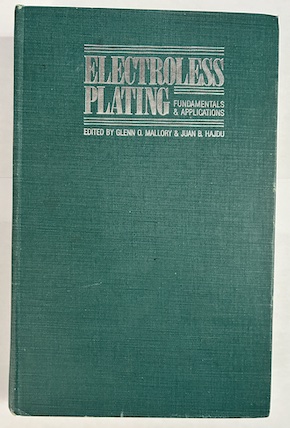
Curated with aloha by
Ted Mooney, P.E. RET

The authoritative public forum
for Metal Finishing 1989-2025

-----
Best Heat Sink Finishes / Surface Treatments
May 20, 2022
Q. Hi,
I had one heat sink of Aluminum which had not any loss of appearance or shine over certain time.
Can anyone give details as to what process was used for coating?

- Pune, India
A. Hi Sujit. The most likely finish is probably clear anodizing. Anodizing imparts a finish of transparent but corrosion-resistant aluminum oxide onto the aluminum.
Luck & Regards,

Ted Mooney, P.E. RET
Striving to live Aloha
finishing.com - Pine Beach, New Jersey
May 2022
⇩ Related postings, oldest first ⇩
Q. Hello,
I am trying to get more heat transfer out of both a copper and an aluminium fin type heat sink. I've heard anodising is good for the aluminium, and enamel based paints are good for the copper. Can anyone suggest if there are any better ones?
Thanks in advance,
Ralph Coakleybroadband networks - Sydney, New South Wales, Australia
2002
A. Any coating that you put on a finned heat sink will act like an insulator. The thicker the coating, the less heat transfer.
James Watts- Navarre, Florida
2002
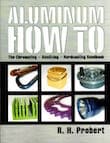
Aluminum How-To
"Chromating - Anodizing - Hardcoating"
by Robert Probert
Also available in Spanish
You'll love this book. Finishing.com has sold almost a thousand copies without a single return request :-)
A. Hey!,
Correct me if I'm wrong, but I understood that anodize dissipates heat better than uncoated aluminum.
Bill Grayson- Santa Cruz, California, USA
2002
A. What you need to look at is the thermal conductivity of the coatings. Both Al and Cu are excellent thermal conductors (copper is almost twice as good as aluminum). Aluminum is more popular due to cost, processability, and weight to name a few. In certain cases copper does have its place.
"A black object radiates the best - so all heatsinks should be black". Maybe. More importantly, are you using natural or forced convection? For forced, the color is irrelevant. Comparison testing of two otherwise identical heatsinks with different colors, the performance delta is usually negligible. Heatsink manufacturers anodize their heatsinks to make them look more attractive. I would focus more on surface finish/roughness of the area contacting the hot component.
Not all coatings degrade thermal conductivity, i.e., copper over aluminum. I have never run across enamel over copper for heatsinks but enamel is a poor thermal conductor. Most copper heatsinks I've seen (CPU over-clocking heatsinks) are pure copper and, I believe, have no coating/plating. This is probably because of the rather benign operating environment.
Richard Huang- San Jose, California, USA
2002
Protecting a telecomm outdoor Aluminum Heatsink
Q. Hi,
I designed an extrusion heatsink (Al 6063T5) for outdoor telecom equipment. This heatsink will be exposed to all kinds of outdoor environment (rain, storm, snow, salt). I chose clear chem film at first but later changed to clear hard anodic coating with dichromate seal. ( for better corrosion resistance) Could anyone verify if this is a valid choice? Is there better suggestions? Also, do I need to specify to mask all thread holes during the anodic process? Please advice.
Thank You,
Telecommunication - Plano, Texas
2004
A. Sounds ideal to me, Shizuko. The threads should be masked (so the spec or drawing should so indicate). Good luck.

Ted Mooney, P.E.
Striving to live Aloha
finishing.com - Pine Beach, New Jersey
2004
Q. Reference to my previous question...
I have chosen hard anodize finish for my aluminum outdoor heatsink. Now that the heatsink vendors (extrusion houses) are telling me that they have trouble finding subcontractors who can do hard anodize for them. Is there an alternate finish I can consider that can provide good environmental/corrosion protection for Aluminum in harsh environment?
Telecom - Plano, Texas
2005
A. Powder coating is an alternative, Shizuko, as is conventional anodizing. But there are lots of hard anodizing shops, so perhaps you shouldn't give up on your preferred finish so easily. Search our jobshops directory for "hardcoat" or "hard anodizing"; it that doesn't find you the shop you need, try the Aluminum Anodizers Council or the AESF shop directory. Good luck!

Ted Mooney, P.E.
Striving to live Aloha
finishing.com - Pine Beach, New Jersey
2005
Treatment &
Finishing of
Aluminium and
Its Alloys"
by Wernick, Pinner
& Sheasby
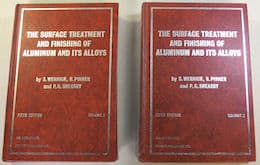
(note: this book is two volumes)
on eBay or
AbeBooks
or Amazon
(affil links)
Q. Firstly, thanks for letting me post this letter. I was quite pleased to come across this website whilst searching the internet for resources.
Basically, we are a small manufacture of electronic products here in Australia. The items we produce are mostly power conversion products for the marine and automotive industries, primarily for DC applications.
Whilst we consider ourselves to be expert in our field of electronics, our knowledge of anodising leaves a little to be desired!
Currently we have our heatsinks produced here in Australia including the anodised finish. We have developed a new product and due to pricing considerations have elected to seek an offshore supplier for the anodising only. Effectively, what I require assistance with is determining a standard of conformity I can specify for the anodising of our product to ensure it meets our performance criteria. Thus far I have drawn a blank. Basically our local anodiser cannot give me more information other than the finished thickness being 15um.
Although our products are used in auto and marine applications they are not fitted externally. Generally, they are fitted within enclosures, engine rooms or cabs and are protected from the mechanical effects of the environment. In marine applications though, there is always the 'salt-laden' air to consider regardless of where the unit is installed.
Our requirement is effectively, for cosmetic appearance, ensuring the mill finish aluminum is completely sealed and for scratch abrasion resistance i.e. from a slipping screwdriver during installation. The maximum operating temperature of the heatsink is 70 °C. The heatsink alloy is 6063 and the temper is T5.
Any opinions or suggestions would be greatly appreciated.
Thank you.
- Perth, WA, Australia
A. Please Hard anodize to about 50 microns to achieve the required properties what you are looking for.
H. K. BAPU RAMESH- Mysore, Karnataka, India
2005
A. Hello,
You may want to look into the various specifications that cover anodizing, most notably
MIL-A-8625 / MIL-PRF-8625
[⇦ this spec on DLA]. There are resources described elsewhere on this site about where to get copies of the specifications, and they may cover everything that you are concerned about.
Primarily you would be looking at three things: Visual appearance (if that is a factor for you), coating thickness (if you're happy with 15 µm, go with it. It is my understanding though that a thicker coating is not disadvantageous with heat sinks though), and corrosion resistance (this would be covered by the specifications).
One other possible consideration would also be the location of the rack marks - this is where the rack actually held the piece in place and there will be no anodizing at that specific point.
Good luck,
Compton, California, USA
2005
2005
Q. I'm having some discoloration problems with some anodized heat sinks.
The extruded heat sink is made of 6063-T5 aluminum. The finish is specified as: Finish per
MIL-A-8625 / MIL-PRF-8625
[⇦ this spec on DLA] C, type II, class 2, .00005-.0010" thick, color black.
The operating temperature of the heat sink is 60-70 °C. I have been informed that it appears that the heat sinks are turning red in color (see attached picture 1)
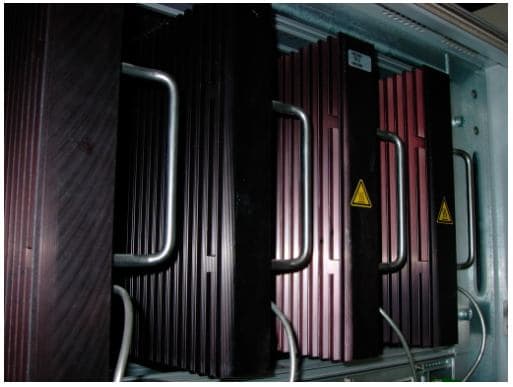
And in a separate situation it looks like they are loosing their black color revealing a gold-ish color (see attached picture 2)
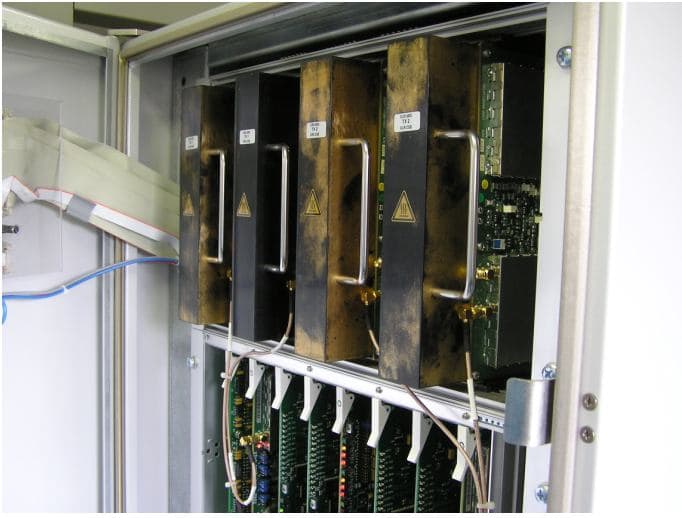
Could the operating temperature be causing this ? Or is there something wrong with the plating ?
Electronics Manufacture - Shawnee, Kansas, United States of America
|
|
A. Heat resistance shouldn't be an issue in the range that you mentioned if everything else was done correctly. You may want to make sure that the anodizer is sealing the parts properly (preferably in a heated nickel acetate seal). Compton, California, USA 2005 A. There are quite a number of different black dyes. Looks like you have one which doesn't have very good heat resistance. Discuss this with your anodizer. He can likely change to a dye which will hold up better.  Jeffrey Holmes, CEF Spartanburg, South Carolina 2005 |
Multiple threads merged: please forgive chronology errors and repetition 🙂
Heat sink anodising
by Runge & Kaufman
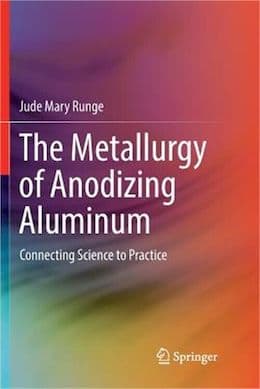
on AbeBooks
or eBay or
Amazon
(affil links)
Q. We are anodizing on extrusions in India. Would like to know about any specific process for anodizing on aluminum extrusion for HEAT SINK purpose and also are interested to know, why Black is preferred and if black than is it to be Matt or glossy?
Ajit PatelAnodizing shop - Valsad, Gujarat, India
2007
2007
A. Black anodized about 5-8 microns thick, matte, is commonly used. Thinner has lower heat emissivity, thicker has lower thermal conductivity, and a rougher surface increases area for heat radiation. Black has higher emissivity than clear anodized. Information primarily from
The Surface Treatment and Finishing of Aluminum and Its Alloys, Chapter 12.
Al 6063-T6 is a commonly used alloy for heat sinks.
- Goleta, California
Rest in peace, Ken. Thank you for your hard work which the finishing world, and we at finishing.com, continue to benefit from.
Q. We use copper for heat sinks and tin plate them. Is there any other type for copper heat sink which looks good and performance is not degraded in terms of heat dissipation?
Yogesh Aare- Mumbai, India
October 5, 2012
A. Hi Yogesh. Nickel plating should work. Electroless nickel plating is very widely used on heat sinks , and very corrosion resistant, but is rather expensive.
Luck & Regards,

Ted Mooney, P.E.
Striving to live Aloha
finishing.com - Pine Beach, New Jersey
Q, A, or Comment on THIS thread -or- Start a NEW Thread

